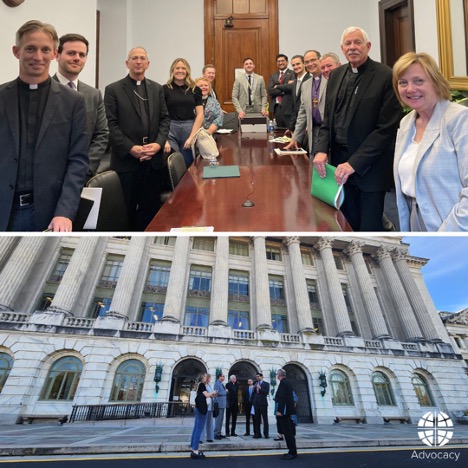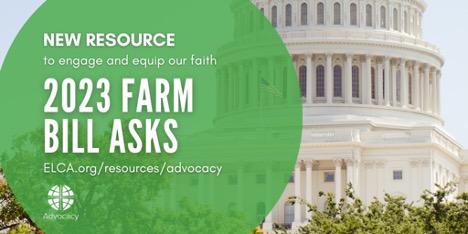November 17, 2023 in Advocacy, Faith in action, News, Transformed
PA Lutherans Advocate for Farm Bill

▶︎ Tell us how your congregation fights hunger: Take our survey
By Rev. Bryan Penman and Rev. Bruce Davidson
In just a days, many of us will gather around tables with friends and family and celebrate a holiday that centers around food. For some of us though, that food will be missing as many in our communities continue to struggle with food insecurity and the rising costs associated with groceries, rents, and the cost of living. Many of our congregations are witnessing this increasing need firsthand through various feeding programs. We have heard from you that what was once stretched thin is now almost to a breaking point. In some places the number of people coming for help has more than doubled, stretching resources of donated food and the availability of volunteers.
On October 26th a delegation of Lutheran bishops, pastors, and deacons from across Pennsylvania assembled in Washington DC to meet with our federal representatives to advance the upcoming Farm Bill. Representing SEPA was The Rev. Bruce Davidson, chair of our synod’s hunger team and The Rev. Bryan Penman, Co-Director of Evangelical Mission.

Working in partnership with the ELCA’s office of Advocacy, we were able to meet with staff in the offices of Senators Casey and Fetterman and Pennsylvania Congressman Glenn Thompson, who chairs the House Agriculture Committee. As leaders in a church body with a long history of providing help to people in need, we wanted to share what we are seeing related to local hunger and the continued role Government can play to help those who experience hunger in our state. Specifically, we wanted to encourage support for an extension of the Farm Bill, which is due to be reauthorized this year.
Many of our congregations report that feeding ministries already stretched thin are almost to the breaking point.
First established in 1938, the Farm Bill addresses an array of agricultural and food issues, including support for farmers growing essential commodities, conservation of farmlands, forestry, trade, and nutrition support for low-income people. It has been reviewed and reauthorized every five to ten years, so far with strong bi-partisan support. It is due for reauthorization this year.
Obviously, the Farm Bill helps farmers: Specifically, farmers managing smaller, independent farms. There are many such farmers in Pennsylvania. The Farm Bill provides financial support and incentives that help them survive and compete with larger corporate agribusiness. This helps maintain family farms and lessens poverty in farming communities. The Bill also supports farmers who want to move toward more environmentally sustainable farming practices but who cannot finance such changes without help. Also, parts of the Farm Bill are being expanded so that farmers can access mental health services and access more holistic care.
As we experience the effects of global climate change, helping farmers to continue to produce food is vital to helping to eliminate hunger in our communities. Provisions in The Farm Bill help make this possible.
Also, a major part of the Farm Bill relates to nutrition support for low-income households. The Farm Bill provides funding for programs like SNAP (Supplemental Nutrition Assistance Program: formerly known as Food Stamps). So among other things, reauthorization of The Farm Bill helps many in our community keep food on the table during these trying times. Part of our advocacy was aimed at making sure that these vital programs continue.
The USDA estimates that only about 30% of the people who qualify for SNAP or WIC are enrolled in these programs.
Pandemic-related aid programs, such as an increase in the Child Tax Credit, cut the incidence of child poverty in half. However, when those programs expired at the end of 2021, child poverty soared back even higher than pre-pandemic levels. Our team encouraged legislators to look toward reinstating and expanding such programs since they successfully reduced hunger among children.
Part of our day also included a meeting with representatives from the US Department of Agriculture (USDA). Our team was able to share some of the ways churches and faith communities are helping to address food insecurity by providing food Pantries and by offering meals. Also, we noted that churches sometimes assist with Federal feeding programs, serving as sites for hunger relief initiatives: often becoming the “last mile” service point for many of them. It was a joy to discover that through the USDA many benefits will be expanded this year during the summer months so families with children can be helped when school feeding programs shut down at the end of the academic year..
We learned that the faith community can do a lot to help eligible people access many of the federal programs designed to address hunger. Right now, the USDA estimates that only about 30% of the people who qualify for SNAP or WIC are enrolled in these programs.
▶︎ More information about the 2023 Farm Bill
It was good to see that legislators of all political parties are working to help hungry people find food. We encourage you to be in conversation with your local members of the House of Representatives and with our United States Senators, encouraging them to support full reauthorization of the Farm Bill. Lutheran Advocacy Ministry of Pennsylvania (LAMPa) has resources that can help people learn more about the Farm Bill and how to communicate with elected officials in support of it. You can also click on the link below: “2023 Farm Bill Asks.” It is urgent that legislators hear from us soon. since some of the Farm Bill provisions have already expired and others are being challenged.
Further advocacy will be needed in the months ahead to expand eligibility and access to Federal hunger programs, especially so a diversity of foods for various ethnic and cultural diets can be made available to people in need.
As we will hear next Sunday, Jesus said: “When I was hungry, you fed me: Thirsty, you gave me a drink… When you did it to one of these least among my sisters and brothers, you did it to me.”
Journeying from office to office was a deeply moving spiritual experience. While we may not have been holding fish and loaves, it felt very much like multiplying the efforts of people all over the country working to alleviate hunger in our country.
We are also exploring ways that our synod engages in Hunger ministries. Please take a moment to fill out our survey below as we work to build a network of disciples who care deeply about helping feed the hungry. To participate in the survey – please click HERE.


